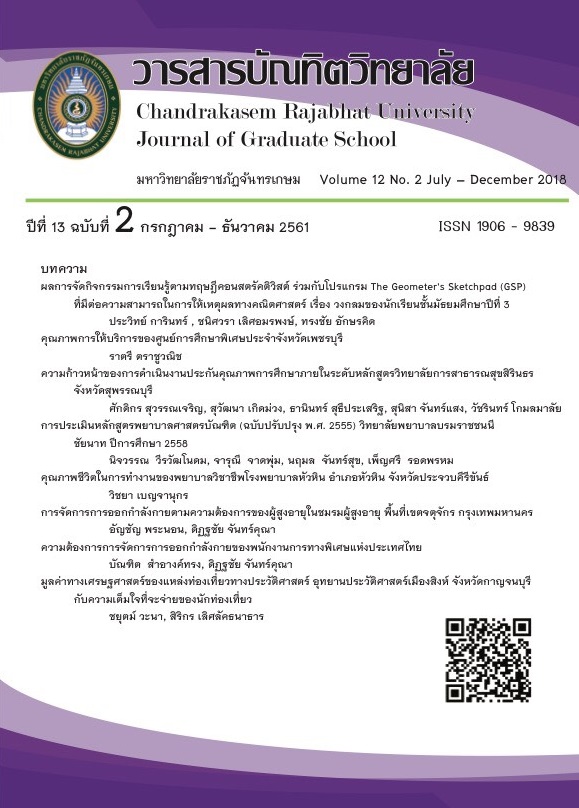Exercise Management on Elderly Demand at the Elderly Clubs in Chatuchak Bangkok
Main Article Content
Abstract
The purposes of this research were to (1) study the exercise demand of the elders in the elderly clubs at Chatuchak district Bangkok and (2) compare the exercise management on elderly demand at the elderly clubs follows by personal information and types of diseases. This research employed quantitative approach. The population was 1,256 elders in the elderly club at Chatuchak district Bangkok. 303 samples was derived from random sampling. Instrument was a questionnaire, conducted by researcher, which validity and reliability at 0.86 and 0.92 respectively. Statistical used for data were percentage, mean, standard deviation, T-test, F-test and One-way analysis of variance with least significant difference (LSD) comparison method. Statistical significance level was set at the 0.05.
The results of the study showed that (1) the demands for exercise of the elders were the highest in all 4 aspect was mostly high and arrange the mean in each aspects from high to low that personnel ( = 4.87), exercise activity managing process ( = 4.77), venue, equipment and facility ( = 4.69) and management ( = 4.54). (2) The comparison of the level of exercise management according to the demands of the elders in the elderly club indicated that those demands for the elders with different average monthly income were statistically difference at the 0.05 level. Those four aspects were management, personnel, venue, equipment and facility, and exercise activity managing process. Moreover, for the elders with different genders, ages and types of disease, two aspects of the demand were significantly different. Those were management and venue, equipment and facility with statistical differences at the 0.05 level.
Article Details
References
2. นิศา ชูโต. (2525). คนชราไทย. กรงเทพฯ: จุฬาลงกรณ์มหาวิทยาลัย.
3. ปณิตา ชะบำรุง. (2549). ปัจจัยที่ส่งผลกระทบต่อพฤติกรรมการออกกำลังกายของผู้สูงอายุในจังหวัดพระนครศรีอยุธยา (วิทยานิพนธ์ศิลปศาสตรมหาบัณฑิต), มหาวิทยาลัยราชภัฏพระนครศรีอยุธยา.
4. กระทรวงการพัฒนาสังคมและความมั่นคงของมนุษย์. (2546). พระราชบัญญัติผู้สูงอายุ พ.ศ. 2546. สืบค้น 7 พฤศจิกายน 2560, จาก http://www.oppo.opp.go.th/pages/law/law09.html
5. พิทักษ์พงศ์ ปันต๊ะ และดาว เวียงคำ. (2554). ความสัมพันธ์ระหว่างปัจจัยส่วนบุคคล การรับรู้ประโยชน์ ของการออกกำลังกายและการรับรู้อุปสรรคของการออกกำลังกายกับพฤติกรรมการออกกำลังกายของผู้สูงอายุในจังหวัดพะเยา. วารสารวิจัยทางวิทยาศาสตร์สุขภาพ, 5(1), 7 - 16.
6. มูลนิธิพัฒนางานผู้สูงอายุ. (2559). สถานการณ์ผู้สูงอายุในประเทศไทย (ด้านประชากร). สืบค้น 7 พฤศจิกายน 2560, จาก https://fopdev.or.th/สถานการณ์ผู้สูงอายุ/.
7. มูลนิธิสถาบันวิจัยและพัฒนาผู้สูงอายุไทย. (2553). รายงานสถานการณ์ผู้สูงอายุไทย พ.ศ. 2553. สืบค้น 7 พฤศจิกายน 2560, จาก http://www.thaitgri.org/index.php?option=com_content&view=article&id=218:2353&catid=50:2011.
8. รุ่งนภา แจ้งรุ่งเรือง. (2550). ความต้องการในการพัฒนาตนเองของบุคลากรองค์กรปกครองส่วนท้องถิ่นในเขตจังหวัดระยอง (รายงานการศึกษาอิสระปริญญารัฐประศาสนศาสตรมหาบัณฑิต) วิทยาลัยการปกครองท้องถิ่น มหาวิทยาลัยขอนแก่น.
9. สังคมสูงวัย & วิกฤติสโลว์ไลฟ์. (1 พฤษภาคม 2560). Way, สืบค้น 7 พฤศจิกายน 2560, จาก https://waymagazine.org/aging_society/.
10. สำนักพัฒนาสังคม กรุงเทพมหานคร. (2559). ข้อมูลชมรมผู้สูงอายุในพื้นที่ 50 เขตของกรุงเทพมหานคร. สืบค้น 7 พฤศจิกายน 2560, จาก http://bangkok.go.th/social/.
11. สุรางค์รัตน์ วศินารมณ์. (2540). สวัสดิการในองค์การ แนวคิด และวิธีการบริหาร. กรุงเทพฯ: เม็ดทราย พริ้นติ้ง.
12. Hainmann and Scott. (1970). Management in the Modern Organization. Carifornia: Houghton Miffin.
13. Longenecker, Justin G. and Charles D. Pringles. (1981). Management. (5th ed.). Columbus, Charles E. Merrill Publishing Company.
14. Maslow, Abraham. (1970). Motivation and Personnality. New York: Harper and Row Publishers.
15.Orem, D. E. (1985). Nursing Concepts of Practice. New York: Mc Graw - Hill.

